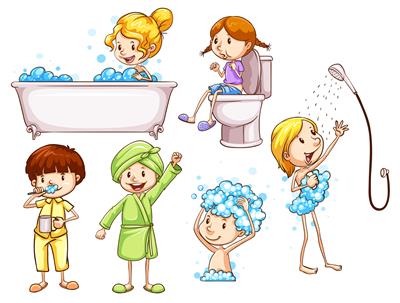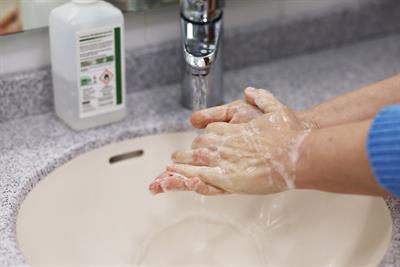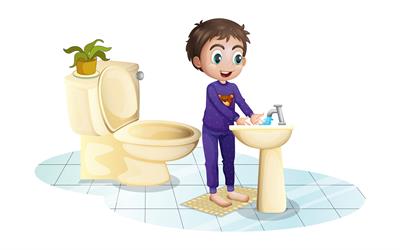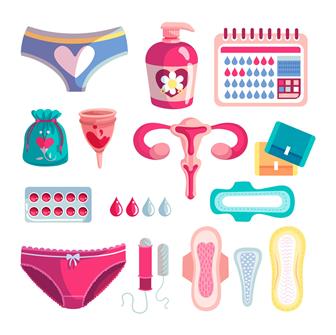PDF chapter test TRY NOW
Hygiene is the practice of healthy living and personal cleanliness.
Hygiene refers to the condition or practices conducive to maintaining health and preventing disease.
Hygiene is the foundation of healthy living. It is a practice of keeping yourself (personal cleanliness) and the surroundings clean, especially to prevent illness or the spread of diseases.
Personal hygiene is caring of one’s own body and health. Social hygiene is proper care of the surrounding environment.
Personal hygiene involves the practices performed by an individual to care for one’s bodily health and well-being through cleanliness. Cleanliness protects against the spread of any infectious disease.
Personal hygiene includes personal habit choices as how frequently you take bath, wash hands, trim fingernails, and change clothing. It also includes awareness to keep surfaces in the home and workplace, including bathroom facilities, clean and pathogen-free.
Personal hygiene includes personal habit choices as how frequently you take bath, wash hands, trim fingernails, and change clothing. It also includes awareness to keep surfaces in the home and workplace, including bathroom facilities, clean and pathogen-free.

Personal hygiene care
The main aspects of hygiene includes body hygiene, food hygiene, sanitary hygiene and hygienic environment. Let us look into each of them.
Body hygiene:
Washing is important for people of all ages as it maintains our personal hygiene. A daily bath helps to maintain skin clean and germ-free. Hair should be washed frequently to keep it clean. Every meal should be followed by a mouthwash. Throughout the day, we should wash our hands several times.

Frequent hand washing to maintain personal hygiene
Cloth towels used to dry our hands or bodies should be thoroughly dried after each usage and washed on a regular basis. Every day, wash your clothes, handkerchief, underwear, and socks. Washing prevents infections, body odour, illnesses, and skin irritation.
Toilet Hygiene:
The toilet has a lot to do with personal hygiene and overall health as it is a place that cannot be avoided and used on a daily basis. Parents should teach and practice how to use toilets at home, at schools, and in other public places so that the children are protected from various contagious infections and diseases. The following measures can be taken to maintain toilet hygiene:

Toilet hygiene
1. Toilet floors should be maintained clean and dry. This aids in the reduction of bad odour and infection.
2. To destroy harmful germs and bacteria, disinfect toilet flush handles, door knobs, faucets, paper towel dispensers, light switches and walls.
3. Hands should be washed thoroughly with soap before and after using the restroom.
Menstrual and napkin hygiene:
Women's health depends on maintaining a high standards cleanliness to avoid from skin and genitourinary tract infection.
Menstrual hygiene:
Maintaining menstrual hygiene is critical for women's overall health. The most basic menstrual hygiene are as follows:
1. Sanitary pads must be changed regularly, to avoid infections caused by vaginal bacteria and sweat from genitals.
2. Cleaning genitals with warm water will help relieve menstrual cramps.
3. Loose clothing, rather than tight clothing, ensures airflow around the genitals, preventing sweating.
Important!
Every year on May 28, Menstruation Hygiene Day is observed to raise awareness of the need of menstrual hygiene for good health among girls and women. Awareness through films, campaigns, discussions and other initiatives has recently taken menstrual hygiene in the centre stage.
Napkin hygiene:
Parents and teachers must educate and create awareness among the school girls about the proper usage of napkins and how to properly dispose of them. The following are some of the ways that girls must be educated:
1. As the sanitary pads and tampons can spread infections, they should be wrapped properly and discarded.
2. Do not flush a sanitary pad or tampon down the toilet.
3. For proper disposal of used napkins, napkin incinerators should be utilised.
Important!
The Health ministry launched a menstrual hygiene scheme in the 2011, to provide subsidised sanitary napkins. UNICEF has designed an economical incinerator that uses firewood to handle the sanitary napkin waste at schools in Tamil Nadu. In this incinerator, special wells have been installed where the sanitary napkins are composted.

Feminine Hygiene Products
Reference:
https://pixabay.com/photos/wash-hands-hand-wash-hygiene-soap-4906750/
https://www.freepik.com/free-vector/boy-washing-his-hands-sink_6024173.htm#page=1&query=toilet%20hygiene&position=20
https://www.freepik.com/download-file/9907633?is_premium_item=0&is_premium_user=0
